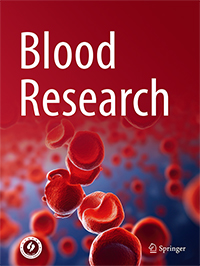Original Article
Korean J Hematol 2007; 42(3):
Published online September 30, 2007
https://doi.org/10.5045/kjh.2007.42.3.276
© The Korean Society of Hematology
Monoclonal Proteinuria as a Prognostic Factor for Multiple Myeloma Patients with Intact Immunoglobulin Type
서철원, 구동허, 오지선, 최성호, 박현구, 이성숙, 김민경, 심선진, 민원기, 김신, 이현아
울산대학 의과대학 서울아산병원 내과
Monoclonal Proteinuria as a Prognostic Factor for Multiple Myeloma Patients with Intact Immunoglobulin Type
Background:
Urine/serum protein electrophoresis (PEP) and immunofixation electrophoresis (IEP) for monoclonal protein (M-protein) are used for initial evaluation in patients with multiple myeloma. We evaluated the prognostic significance of M-proteinuria status and its association with other prognostic factors.
Methods:
Between December 2002 and December 2004, 64 de novo symptomatic multiple myeloma patients with intact immunoglobulin (Ig) type were divided into two groups according to their initial urine PEP/IEP findings.
Results:
Twenty-seven patients with undetectable or free light-chains only were classified into F group, and 37 with whole Ig with or without light-chains were classified into W group. The two groups were similar in sex, age, performance, azotemia, β2-microglobulin, stage and treatment, but M-protein concentration was significantly higher in the W than in F group (5.1 vs 1.3g/dL, P<0.01). The overall response rate was significantly higher in F group than in W group (80.8% vs 63.6%, P=0.02), whereas the 2-year OS rate did not differ significantly between the groups (81.0% vs 57.7%, P=0.15).
Conclusion:
Monoclonal proteinuria is helpful in identifying patients with advanced disease and poorer prognosis in multiple myeloma.
Keywords Multiple myeloma, Proteinuria, Prognosis
Article
Original Article
Korean J Hematol 2007; 42(3): 276-282
Published online September 30, 2007 https://doi.org/10.5045/kjh.2007.42.3.276
Copyright © The Korean Society of Hematology.
Monoclonal Proteinuria as a Prognostic Factor for Multiple Myeloma Patients with Intact Immunoglobulin Type
서철원, 구동허, 오지선, 최성호, 박현구, 이성숙, 김민경, 심선진, 민원기, 김신, 이현아
울산대학 의과대학 서울아산병원 내과
Monoclonal Proteinuria as a Prognostic Factor for Multiple Myeloma Patients with Intact Immunoglobulin Type
Dong Hoe Koo, Ji Seon Oh, Seong Ho Choi, Hyun Gu Park, Sung Sook Lee, Min Kyoung Kim, Sun Jin Sym, Won Ki Min, Shin Kim, Sheol won Suh, Hyun ah Lee
Departments of Internal Medicine, Laboratory Medicine, Asan Medical Center, University of Ulsan College of Medicine, Seoul, Korea
Abstract
Background:
Urine/serum protein electrophoresis (PEP) and immunofixation electrophoresis (IEP) for monoclonal protein (M-protein) are used for initial evaluation in patients with multiple myeloma. We evaluated the prognostic significance of M-proteinuria status and its association with other prognostic factors.
Methods:
Between December 2002 and December 2004, 64 de novo symptomatic multiple myeloma patients with intact immunoglobulin (Ig) type were divided into two groups according to their initial urine PEP/IEP findings.
Results:
Twenty-seven patients with undetectable or free light-chains only were classified into F group, and 37 with whole Ig with or without light-chains were classified into W group. The two groups were similar in sex, age, performance, azotemia, β2-microglobulin, stage and treatment, but M-protein concentration was significantly higher in the W than in F group (5.1 vs 1.3g/dL, P<0.01). The overall response rate was significantly higher in F group than in W group (80.8% vs 63.6%, P=0.02), whereas the 2-year OS rate did not differ significantly between the groups (81.0% vs 57.7%, P=0.15).
Conclusion:
Monoclonal proteinuria is helpful in identifying patients with advanced disease and poorer prognosis in multiple myeloma.
Keywords: Multiple myeloma, Proteinuria, Prognosis

Article Tools
Stats or Metrics
Related articles in BR
-
Frontline therapy for newly diagnosed patients with multiple myeloma
Sung-Hoon Jung, Jae-Cheol Jo, Ga-Young Song, Seo-Yeon Ahn, Deok-Hwan Yang, Jae-Sook Ahn, Hyeoung-Joon Kim, Je-Jung Lee
Blood Res 2020; 55(S1): S37-S42 -
STAT3 expression is associated with poor survival in non-elderly adult patients with newly diagnosed multiple myeloma
Sung-Hoon Jung, Seo-Yeon Ahn, Hyun-Woo Choi, Myung-Geun Shin, Seung-Shin Lee, Deok-Hwan Yang, Jae-Sook Ahn, Yeo-Kyeoung Kim, Hyeoung-Joon Kim, and Je-Jung Lee
Blood Res 2017; 52(4): 293-299 -
Soluble syndecan-1 at diagnosis and during follow up of multiple myeloma: a single institution study
Ji Myung Kim, Jung Ae Lee, In Sung Cho, and Chun Hwa Ihm
Korean J Hematol 2010; 45(2): 115-119




 PDF
PDF Standard view
Standard view Export citation
Export citation Share
Share  Previous Article
Previous Article



